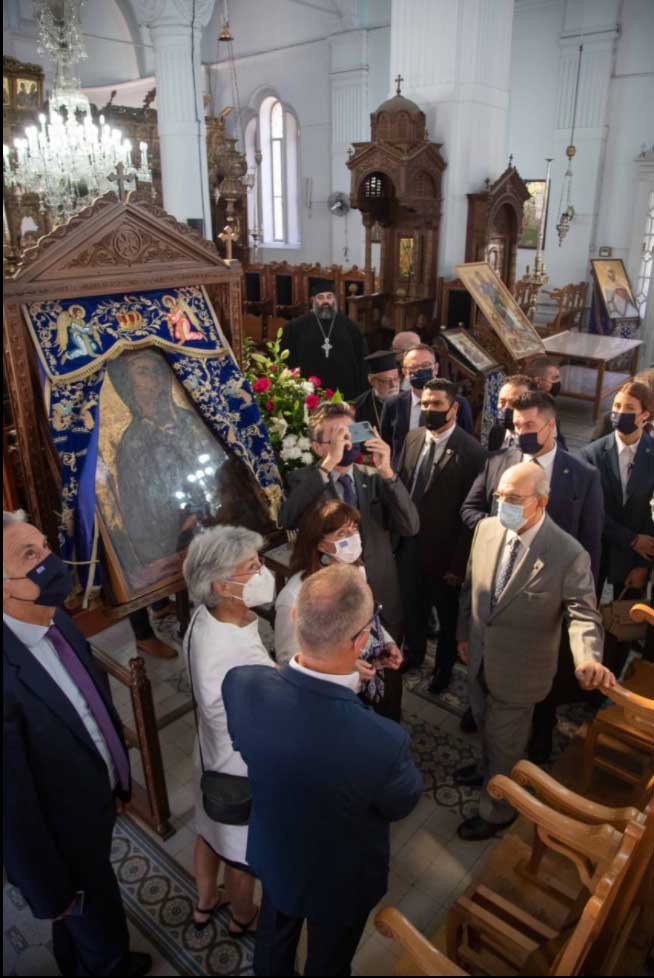The Cyprus Mail continues its weekly feature talking to an individual who represents a specific group on how they have survived a year like no other. This week, a senior citizen
Nicos Lakoufis is 86. That’s a significant fact – almost a political statement – in the time of Covid-19, placing him squarely in the so-called ‘vulnerable groups’ whose risk of dying from the virus is many times higher than it is for the under-70s. His life has indeed been upended in the past few months – yet perhaps not as much as one would expect, and less so than many of his peers.
Lakoufis has two great advantages when it comes to life during Covid. The first is that his daughter and her husband live close by, offering support when needed; during the lockdown in April and May she did the shopping for him and his wife, and delivered it to their door. The second is that he remains very active – an important aspect, given that the toll of the pandemic is psychological as well as physical.
A former chartered accountant, he now runs a business-services firm, going to the office every day for a few hours. (He and his secretary wear masks when approaching each other, and all visitors also wear masks.) He’s also chairman of the church committee of Phaneromeni in old Nicosia, which keeps him very busy. He even attended Sunday services there, albeit with caution, until they were banned last week.
There’s a third great advantage, in that he appears to be quite computer-savvy – a vital skill, now that so much of daily life has migrated to the internet. “It’s not difficult,” he shrugs. “At the office I spend my whole day in front of the computer anyway, and at home I have the laptop.” That’s a bit untypical, and he does admit that many of his generation might be struggling with the change – though his own friends seem comfortable with Zoom, which is how they’ve continued to socialise during Covid, turning their twice-weekly lunches and afternoon coffees into twice-weekly Zoom sessions.
It’s not the same, obviously. Inviting friends over (“15-20 friends, like we used to”) is perhaps what he misses most, from the ‘old normal’. Still, the internet is crucial – not just for friends but also online banking, paying bills and so on.
Otherwise, physical contact is limited to the absolutely necessary. Lakoufis’ wife goes to the supermarket once a week, during the early-morning hours reserved for vulnerable groups, and they draw cash from ATMs only when distancing is possible. Walking the dog is carried out at 5.45am when the streets are deserted (and masks usually unnecessary); his wife goes again in the afternoons, with a mask.

“Our most serious problem, really, is fear,” he says soberly – putting his finger on the crux of the matter, which is that daily life is not the biggest issue for the over-70s, assuming they’re in reasonably good health and have some support system. Life has been diminished, but not unmanageably. The real problem – much less of a problem for younger people – is existential, the fear of death which naturally accompanies old age made immensely more vivid and immediate. It must be deeply unnerving to feel the constant presence of an illness that targets you specifically, a constant reminder of vulnerability.
Lakoufis doesn’t appear to be a morbid or self-pitying person – but his mind often dwells on the fact that even a severe case of Covid (let alone dying from the virus) is singularly hard and unpleasant; “Those who are intubated really suffer,” he notes. He himself, like so many of his peers, has underlying conditions (he’s had a couple of operations over the years) and feels he has to be very careful. Even the thought of having to go to hospital for non-Covid reasons is frightening, with hospitals increasingly swamped. He’s in good health, but did have to go for an MRI recently – fortunately in September, when the situation was much better.
Like most people, especially perhaps of his generation, Lakoufis seems to have faith in the government and the authorities. He’s scathing about youngsters being careless and spreading the virus, and sticks to the rules religiously. He’ll wear a mask outside, even when walking from the office door to his parked car – but is also, for instance, tentatively looking forward to a proper Christmas lunch with his daughter and granddaughters, since the rules (at least for now) allow up to 10 people per household. He’s not paranoid, just meticulous.
Needless to say, it’s been a strange, surreal year. On Easter Sunday, when the family always eat together, his daughter made souvla and left it on her parents’ doorstep (walking away before they opened the door); they, in turn, made avgolemoni soup, and left it on their doorstep for her to pick up. Fear has become second nature. Any time you so much as cough, he admits with a laugh, “you immediately start examining yourself, to see if you have symptoms!”. Still, life for those in the vulnerable groups appears to be bearable, as long as they’re not too isolated and know their way around a computer screen.
“It’s something you can live with,” shrugs Lakoufis. “As long as you’re able to look forward and say: ‘OK, I have to live my life like this for two, three, four months, and then it’s over’. The way things are going, however,” he adds unhappily, “we don’t know if we’ll have to continue wearing masks like we do now, and for how long.” For the over-70s – even more than the rest of us – the nightmare can’t end soon enough.


